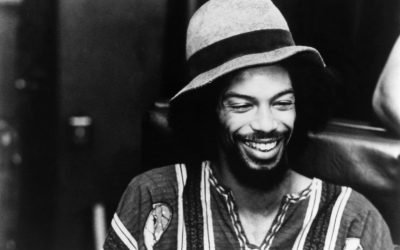Gilbert Scott-Heron, often hailed as the godfather of rap, was an influential American soul and jazz poet, musician, and author known for his socio-political content, laconic delivery, and significant impact on future generations of hip-hop artists. However, reducing him to a precursor of rap does not do justice to the breadth and depth of his work.
Scott-Heron’s artistry spans beyond music to encompass thought-provoking poetry and writing, tackling issues like social justice, racial inequality, and political apathy. His famous phrase, “The Revolution Will Not Be Televised,” encapsulates the essence of his message: real change happens in the minds and actions of people, not through the passive consumption of media.
Early life and education
Born on 1 April 1949 in Chicago, Illinois, Gil Scott-Heron’s journey was marked by a diverse web of experiences that shaped his voice and vision. His mother, Bobbie Scott-Heron, was an opera singer, while his father, Gil Heron, known as “The Black Arrow,” was a soccer player for Celtic Football Club in Glasgow. Despite their talents, Scott-Heron’s early life was not without challenges. His parents separated, and he moved with his mother to Jackson, Tennessee, experiencing firsthand the harsh realities of racial segregation in the South.
Later, settling in New York City’s Bronx borough, Scott-Heron’s worldview expanded as he navigated the complexities of urban life. His education played a pivotal role in honing his voice. At DeWitt Clinton High School, he was influenced by the social and cultural upheavals of the 1960s. His pursuit of higher education took him to Lincoln University in Pennsylvania, a historically black college where Langston Hughes, a seminal figure in the Harlem Renaissance, had once studied.
Scott-Heron’s connection to Hughes was not coincidental but a testament to his deep engagement with African American literary traditions. Although he did not complete his degree at Lincoln, the university was where he met Brian Jackson, with whom he would form a lasting musical partnership.
Scott-Heron’s early life and education laid the foundation for a career that was as much about creating art as it was about challenging the status quo. Through his music, writings, and activism, he sought to illuminate the struggles and aspirations of African Americans, urging a critical examination of society and its inequities.
Musical career and works
Gil Scott-Heron’s musical career was a vibrant tapestry that wove together elements of jazz, blues, soul, and spoken word, creating a genre-defying sound that was both unique and impactful. His debut album, “Small Talk at 125th and Lenox,” released in 1970, was a bold statement that introduced his incisive socio-political commentary to the world. Recorded live, the album featured spoken-word performances that resonated with the urgency and turbulence of the times, including the seminal track “The Revolution Will Not Be Televised.” This piece, with its percussive background and spoken lyrics, critiqued the superficiality of mass media and consumer culture, urging listeners to engage actively with the world around them.
Following his debut, Scott-Heron’s 1971 album, “Pieces of a Man,” marked a significant evolution in his sound. Incorporating more conventional song structures and Brian Jackson’s soulful musical arrangements, the album’s title track and “Home Is Where the Hatred Is” offered a poignant exploration of personal and societal struggles. Scott-Heron’s lyrics seamlessly blended the personal with the political, making his songs relatable and resonant.
Perhaps his most acclaimed work, “Winter in America” (1974), captured the disillusionment and despair of the post-civil rights era. The title track lamented the absence of political leadership and hope. The album, devoid of major label support, nonetheless achieved critical acclaim and resonated with a wide audience, solidifying Scott-Heron’s place in the pantheon of American musicians who used their platform to challenge and inspire.
Throughout his career, Scott-Heron’s music remained deeply intertwined with his activism. Albums like “The First Minute of a New Day” and “From South Africa to South Carolina” continued to address issues ranging from apartheid in South Africa to economic inequality in the United States. His ability to convey complex messages through a blend of compelling music and insightful lyrics earned him the admiration of peers and the reverence of a generation of artists influenced by his work, from hip-hop MCs to neo-soul singers.
Poetry and writing
Beyond his music, Gil Scott-Heron was a prolific writer whose poetry and prose extended his critique of social injustice and his exploration of African American identity. His first published work, “The Vulture” (1970), was a novel that depicted the lives of young African Americans in New York City, illustrating the systemic violence and oppression they faced. Following this, “The Nigger Factory” (1972), another novel, delved into the complexities of racial identity and the commercialisation of African American culture, showcasing Scott-Heron’s sharp wit and profound social insight.
Scott-Heron’s poetry, collected in works such as “Now and Then” and “So Far, So Good,” echoed the themes of his music and novels. Through his writing, he sought to articulate the experiences of African Americans, offering both critique and celebration of their resilience and creativity. His work, characterised by its directness and rhythmic cadence, bridged the gap between the written word and musical expression, highlighting the power of poetry as a tool for social commentary and change.
Political activism and legacy
Gil Scott-Heron’s contributions to music and literature were inextricably linked to his activism. He used his platform to highlight issues such as civil rights, apartheid, and environmentalism, infusing his art with a sense of urgency and a call to action. His influence extended beyond his own generation, inspiring artists and activists with his commitment to speaking truth to power.
Despite battling personal demons and facing challenges in his later years, Scott-Heron’s legacy as a pioneering voice in the fight for social justice endures. His work continues to inspire a new generation of musicians, poets, and activists who draw upon his example to create art that challenges, provokes, and uplifts.

via Wikimedia Commons
On 27 May 2011, Gil Scott-Heron died, but his message and music remain as relevant and powerful as ever. His declaration that “The Revolution Will Not Be Televised” reminds us that meaningful change requires active participation and critical engagement with the issues of our time.
Gil Scott-Heron’s artistry and activism carved a niche that transcended musical genres and political movements. His ability to articulate the complexities of the African American experience and his unyielding commitment to social justice made him a critical figure in American culture. As we continue to navigate the challenges of our own era, Scott-Heron’s work offers a beacon of inspiration and a reminder of the power of art to transform society. The revolution he spoke of may not be televised, but its echoes are heard in the voices of those who continue to fight for a more just and equitable world.





